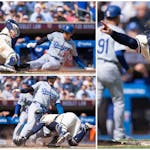FORT MYERS, FLA. – Ask Ryne Harper if he's ever heard of Archibald ''Moonlight'' Graham, and he doesn't flinch. Doesn't smile, either, and this is a friendly, soft-spoken Tennessean who is always smiling.
"I know the reference," Harper says flatly.
He probably wishes he didn't. The longtime Chisholm, Minn., physician, buried in Rochester after his death in 1965, was immortalized in the W.P. Kinsella novel "Shoeless Joe," and the 1989 Kevin Costner movie "Field of Dreams" based on it, for a major league career that lasted just a half-inning in 1905, without ever getting to bat or field a ball.
"It was like coming this close to your dreams," the actor Burt Lancaster, portraying an elderly Graham, says in the movie, "and then watching them brush past you like a stranger in the crowd."
Harper, unfortunately, can relate — and he didn't even get a half-inning. That's why he's happy about his spotless spring with the Twins, why he's optimistic about the 2019 season but is definitely not counting on his luck changing. But he's also not ready to embody another of Lancaster's lines from the movie, either: "I couldn't bear the thought of another year in the minors," Graham says, "so I decided to hang them up."
Harper is a righthanded reliever, a curveball specialist who turns 30 in 10 days and has appeared in a whopping 293 minor league games over eight seasons, with great command of the strike zone and 553 strikeouts in 453 innings. It's a résumé that, in these days of revolving doors in the bullpen, should have landed him in the majors.
And it did. For three games. None of which he appeared in. He's worn a uniform in a major league game, but he's never played in one.
"It was unfortunate, but it's OK. It's part of the business," he said of his May 29-31, 2017, career with the Seattle Mariners. "Obviously, I wanted to pitch, to get a chance to play, but the cards didn't fall that way."
Like all ballplayers who get the call to the majors, Harper remembers that night vividly, as the thrill of a lifetime, but especially so for a pitcher who had languished for four solid years in Class AA, despite being consistently effective. Maybe it was that his fastball doesn't climb beyond 92 miles per hour, maybe it was that he was a 37th-round selection in 2011 out of little Austin Peay University, maybe it was that teams viewed his success as a reflection of the fact that he was older than most players at his level. Whatever the reason, Harper wasn't on the Mariners' 40-man roster and hadn't met Seattle manager Scott Servais when the call came.
"It was amazing. It came totally out of the blue," said Harper, who had three saves and a 1.19 ERA when he was promoted. Pat Listach, his manager at Class AAA Tacoma, called him in after a Friday night game and told him apologetically that he was temporarily being demoted to Class AA. As Harper fumed, Listach handed him his airline itinerary and asked him whether he could make the flight. That's when Harper noticed the ticket was to Boston, where the Mariners were playing the Red Sox.
"It was the greatest feeling. It was late at night, but I got to call my family and let them know I was flying across the country," Harper said. "I called my parents [in Clarksville, Tenn.], my girlfriend [now-fiancé Carson McKay], my brother, and they all flew to Boston."
He was activated for Sunday's game, but didn't pitch in Seattle's 5-0 win. His family went back to Tennessee as the Mariners moved on to Denver, where a group of friends from his hometown met him, expecting to see his debut during a two-game series with the Rockies. But though Servais used nine different pitchers during the Mariners' sweep, Harper wasn't one of them. He didn't even warm up. And after Tuesday's game, Servais told him that the team needed to activate starter James Paxton from the disabled list, and he was being optioned back to Tacoma.
Harper said he was disappointed but not devastated. He kept his Mariners uniform — now framed in his parents' home — as a souvenir. He earned the MLB minimum salary for three days, a total of $8,770, which was more than a month's pay in the minors. And he can say he's a major leaguer, though not necessarily in the Baseball Encyclopedia.
"I got to see two cool stadiums. It was a surreal experience, just awesome. It was everything everyone says it is," Harper said. "[Servais] said, 'I'm sorry we didn't get to put you in there, but hopefully we'll get you back up here and give you another opportunity.' "
It never happened, though. In another roster crunch just two weeks later, the Mariners outrighted him off the 40-man roster. When the season ended, Harper contacted Twins scout Derrick Dunbar, who was the hitting coach at Austin Peay during his time there, and asked if Minnesota would be interested. The Twins were, and Harper had another strong season at Chattanooga, where he made the Class AA All-Star team, and then at Rochester. He only walked five batters at each level, a reflection of his command of the strike zone.
"I'm better at attacking hitters and changing speeds now. And as far as the arm and body, I feel better now than I've ever felt in my career," Harper said. "I feel comfortable and in control out there."
It shows. After coming back on another minor league contract this spring, he's gotten noticed by striking out 10 batters over seven scoreless innings.
"He can do some pretty interesting things with the baseball. He can spin the ball," Twins manager Rocco Baldelli said. "This is a guy who misses bats. He's been a quality minor league pitcher, and someone who is a potential quality major league pitcher as well."
Maybe Harper will be able to smile at the mention of ''Moonlight'' Graham yet.






